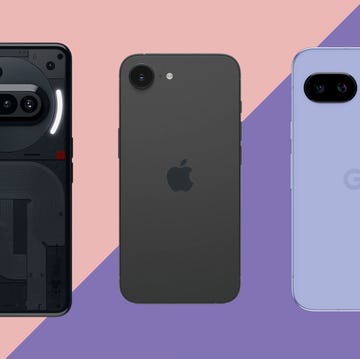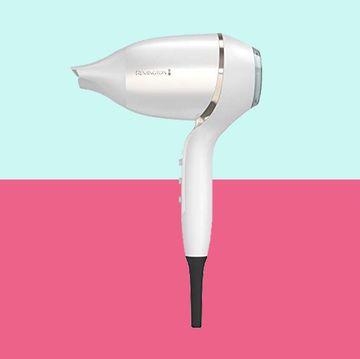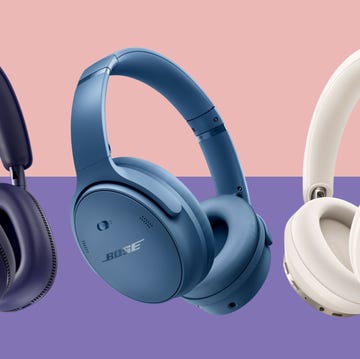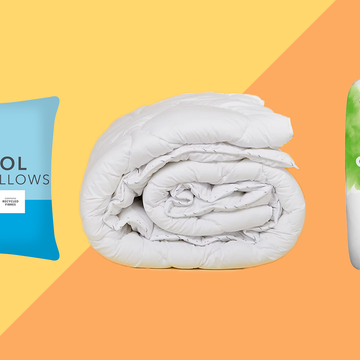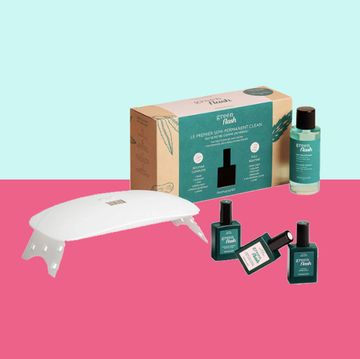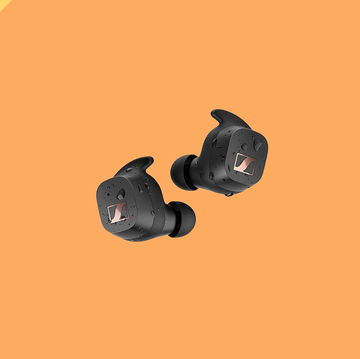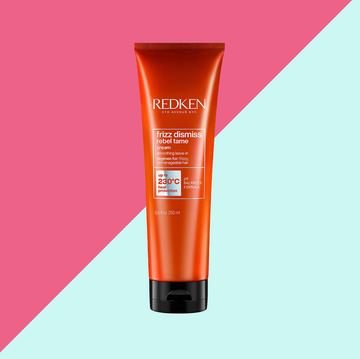As I stomped from the cosy confines of my cabin in the woods at the end of a 72-hour digital detox, I felt nervous about unsheathing my phone from its sock in a box. I apprehensively held down the side button for three seconds, scared of seeing the screen glow with a slew of big, red WhatsApp notifications, emails, texts, DMs and everything else.
This was back in 2023, and two years down the line, after vowing to spend more time offline, I’m once again convincing myself I need my phone ‘for work!’ or ‘for maps!’ or ‘for Lime bikes!’. All of which is true (kind of), so when I pitched the idea to some of my Good Housekeeping colleagues that we might club together and give up our digital devices for a week, I was stunned by the reaction – people were desperate to do it.
Our tech editor compared the prospect to “doing life in hard mode”, and really didn’t get it, but almost everyone else I told said “Ooo, I’d so love to do that, but I need my phone for work/travel/the kids.”
Our collective desire to be more offline was palpable, but the voice telling us to chuck our phones out of the nearest window and buy a brick phone is often drowned out by legitimate excuses about feasibility. We’ve constructed a cage of constant internet consumption, and now we can’t find the key.
In a bid to find out if we really need to be constantly online, and make things a little interesting, I enlisted a phone-reliant Gen Zer and a social media snob of a Gen Xer to balance out my millennial habits and do as I did, cutting all ties with our trusty smartphones for a whole week. I felt we’d all have different gripes and good bits to report, which we did, but the unifying opinion was this: life is far more inconvenient, but without digital distraction, there are flashes of connection that feel infinitely more fulfilling. Except for Simon, our Gen Xer, who didn’t have many nice things to say about the experiment. More on that later…
How we did it
When our tech team tested the best dumb phones for fuss-free calling and texting, the Nokia models held up well against the competition for battery life and general basic-ness (no internet, no maps). More importantly, perhaps, they all allowed us to play Snake and Tetris. Sold.
Myself and my Gen Z colleague nabbed the nostalgic noughties-style flip phones (Nokia 260 flip) and our Gen Xer got the Nokia 3210. We spent a week without our iPhones, keeping them turned off and, in my case, hidden by my partner somewhere I couldn’t find it. No you have a problem.
Here’s how it went.
Florence Reeves-White (me, hi!)
Millennial, self-confessed group chat fiend
How bad could it be? Going into this experiment, my biggest fear was my crippling FOMO. So, not knowing whether a funny anecdote from the weekend or a bit of hard-hitting news (celebrity gossip) was being critically analysed in one of my WhatsApp group chats was, for me, the most terrifying part of parting ways with my smartphone.
But I approached the experiment with the respect it deserved and gave my partner my device to keep away from me for the week. On the first day, I was striding along the streets of London to my office full of the joys of being untethered. I’d done it. I’d ignored all my impulses and broken up with the internet, with which I knew I was in a toxic, one-sided relationship.
The good bits about giving up my smartphone
I didn’t transfer any numbers to my new phone, so could only speak to people whose digits I knew off by heart. My grandparents and parents became suspicious because I started to call them most days “just to chat”. Where I might have listened to music or a podcast as I mooched on my lunch breaks, I felt more connected than ever to those closest to me – texting took so long that it was simpler to just pick up the phone. Revolutionary.
Not having a phone camera worth speaking of (the Nokia has one, but it’s hard to distinguish what the pics are of as they’re so pixelated) meant I was more in the here and now. I went on a foodie excursion with friends to Deal in Kent, where I’d usually have been the trip’s resident photographer. But, this time, I just got a handful of genuinely good, considered shots on my film camera, without clogging up my iCloud with hundreds of photos and videos.
I also couldn’t pay back their Splitwise requests while I didn’t have a phone, which if you’ve used the app, you’ll know is only a good thing. Again, I felt more engaged with my friends and the experience, likely because I wasn’t wondering whether anyone had liked my Instagram post of the chicken schnitzel I’d had for lunch.
That brings me on to social media – for me, a break from Instagram made me so much more productive in the evenings. Where I’d normally come home and curate a post or tap through Instagram Stories of work acquaintances, instead, I spent my nights doing extra writing, reading my book for an hour longer and generally doing things that nourish me. The main thing I learnt when I did my cabin detox was the importance of boredom for creative minds. For anyone, really. Once you stop reaching for your phantom phone after the first few days, you spend time looking for other ways to entertain yourself.
Because I hadn’t been in constant communication with my boyfriend all day, updating him on what dressing I had on my salad for lunch (vegan jalapeño Caesar? Or miso and peanut?) and what meetings I had, and vice versa, when we got home, we felt like we had so much to catch up on. We sat eye to eye and regaled each other with tales of our days (I’d gone for jalapeño Caesar in the end, he was surprised to hear) and it was much more magic than just sticking a series on.
In not being distracted – and not being constantly available to everyone – I felt like I’d found glimpses of real connection in so many of my relationships again, and conversations felt sharper at the edges because they weren’t competing for my attention.
The bad bits about giving up my smartphone
I’d just started a 70-day programme on a fitness app when I switched to my flip phone for the week, so obviously that threw a bit of a spanner in the works. I tried to motivate myself to do the same workouts, or what I could remember of them, for the same length of time in the gym, but with no music or podcast to entertain me, I often got bored far quicker than I normally would and gave up.
What I will say is that I was more efficient, with nothing to scroll through and no emails to reply to between sets. I swapped from machine to mat without hesitation, getting more movement packed into the admittedly smaller timeframe I could manage before tedium struck.
Running was also a challenge – I’d recently got back into longer distances before starting this week, but even though I knew how many laps I needed to do of my local park off by heart, getting the whole way round was truly, painfully boring. I was better connected to my breath, and actually found it physically easier, but mentally it was way tougher to keep at it for a long time.
No Apple Pay, no visibility of my mobile banking app and no Google Maps did pose a few issues. Asking people for directions and following signs is all well and good until you’re meeting people at a random restaurant nobody’s heard of, or going to a friend’s address that strangers you pull aside weirdly don’t know how to get to. People also get freaked out in London if you ask them for directions, which I learnt quickly from a series of panic-struck stares.
Oh, and one of my friends thought I’d been taken ill or gone missing and nearly called the police, as I’d neglected to tell her about the dumb phone thing. She still didn’t actually think to just pick up the phone to call me to ask what was going on, firing off texts to all our friends instead. The millennial fear of the phone call is real, folks.
Simon Swift
Gen X, never not plugged into his music/podcast/audiobook
The good bits
While I was already off social media and not on WhatsApp, I’m addicted to podcasts and audiobooks. I have no idea how that happened. I’ve also started listening to green, pink, black, white noise when I go to sleep. I’m rarely without headphones on and frankly, that worries me a bit. I feel I’ve disconnected from the world around me.
I thought a dumb phone might help knock the constantly-plugged-in habit on the head. And it did! I read a magazine on the train instead, and I didn’t listen to podcasts, which meant I didn’t start the day hearing a lot of bad news.
The bad bits
Texting. I think if you have to communicate with friends and family quickly then this is a problem. I learned that sometimes you can’t go back. Sat next to my partner on the train, he was texting with the swipe of a finger across his phone. Meanwhile, I was clunkily tapping buttons two, three, four times to get one letter.
I used a pocket A to Z instead of Google Maps to meet friends at a pub and realised that my eyesight is not what it once was. I had to resort to calling them instead and just shouting ‘where are you?’ out loud. I found them by sheer luck.
I like being engaged with the world around me. In a fast moving, unprecedented period for news, I want to know what’s happening. I don’t think I can retrain my brain in that regard.
Also – and this is the worst part – I’m too fat-fingered now to play Snake. I kept hitting ‘pause’ or ‘new game’. I’m all for the future being bright for the dumb phone, but this is just too small, too limited, too frustrating for a 47-year-old to get used to again.
Megan Geall
Gen Z, serial scroller – even while ‘watching’ TV
The good bits
Switching off my smartphone for a week actually made me more connected to some people. I would get bored or frustrated at trying to type out long messages on the Nokia, so I’d just end up calling people instead to ask simple things like what time I was meeting them and where.
One of the biggest pros for me was actually watching a new TV series and paying attention to the whole thing. I’m very guilty of picking a new show to watch, losing interest within a few minutes and then double screening and scrolling on Instagram or TikTok while it plays away in the background. But without a smartphone, I had to sit and watch with no distractions and (shock) I actually enjoyed the programme I put on!
Another great part off the back of that is screen time and getting a break from social media – it was so nice to be disconnected for a while and not watching what everyone else is doing with their lives, just actually living mine.
The bad bits
It took me longer than I’d like to admit to get used to the keyboard again and it quickly got frustrating having to press the buttons multiple times to get to the right letter.
This was ever so slightly embarrassing when getting it out in public – I felt like I got some odd looks when typing out a message in the gym – but by the end, I’d kind of got used to it and didn’t really care what people thought about me and the phone, which is definitely a good thing.
Speaking of the gym: MUSIC. Not having Spotify or being able to connect my headphones all week was a major downside. Gym music just isn’t good… It was kind of nice to do a run without anything though, helping me connect a little more with nature. I wouldn’t want to do every run without something to listen to, so I’d need to invest in an iPod if I were to use the phone full-time.
Paying for things was tough. I use Apple Pay for everything. I buy my train ticket on the Trainline app every morning and I use my phone to pay for every single purchase. So much so, that I’ve forgotten my pin. I was fine while I could use my contactless card to tap for things but then my card got blocked from tapping (assuming the bank thought someone had stolen my card because it was actually being used for once), so I had to insert it and put my pin in. I had a humbling experience in a café where I tried to buy a drink, couldn’t remember my pin, and the lady gave me my drink for free if I promised to come back the next day and pay (which I did).
The honest verdict
Our Gen Zer, Megan, said she wouldn’t make the switch to a digital device, as she found the whole thing too inconvenient. Simon the Gen Xer said he’s an old dog and he can’t (re)learn old tricks. I, on the other hand, will definitely be doing this again, and for longer next time. I’ve been threatening to get serious about writing a book someday, so what better way to shut myself off from the world when the time comes?
In terms of what I’ll do differently, next time I’ll transfer over a bigger bank of contacts. I’ll let everyone know well in advance where to find me, so I don’t return to my (already stressful) smartphone to a stream of incensed messages from friends. I’ll take a book, pen and paper with me every time I leave the house in case I’m left waiting for anyone and, in all honesty, I’ll endeavour to travel to new places with someone who has access to Google Maps. Because that really does help.
Florence is our Senior Beauty Writer, specialising in expert-tested beauty and grooming reviews — from toothbrushes to the latest skincare launches. She’s committed to sharing recommendations for products that truly work and make people feel confident and healthy. Prior to this she was at Tropic Skincare, where she worked closely with biochemists in the lab, delving into the functions of each fresh, natural ingredient and conveying its efficacy to her audience in easy-to-digest terms.
With over five years’ experience in beauty and health journalism, Florence has written for ELLE, Women’s Fitness, Sister Magazine, National Geographic Traveller and many more, with a strong sustainability angle thread through much of her work.
When she isn’t packing for a trip away, working out, eating out or reading up on retinol serums, you’ll probably find her experimenting with her film camera and building her portfolio of portraits. Florence’s photography can be found at florencereeves-white.com, her Instagram is @florencereeveswhite and her twitter is @floreadsnwrites











